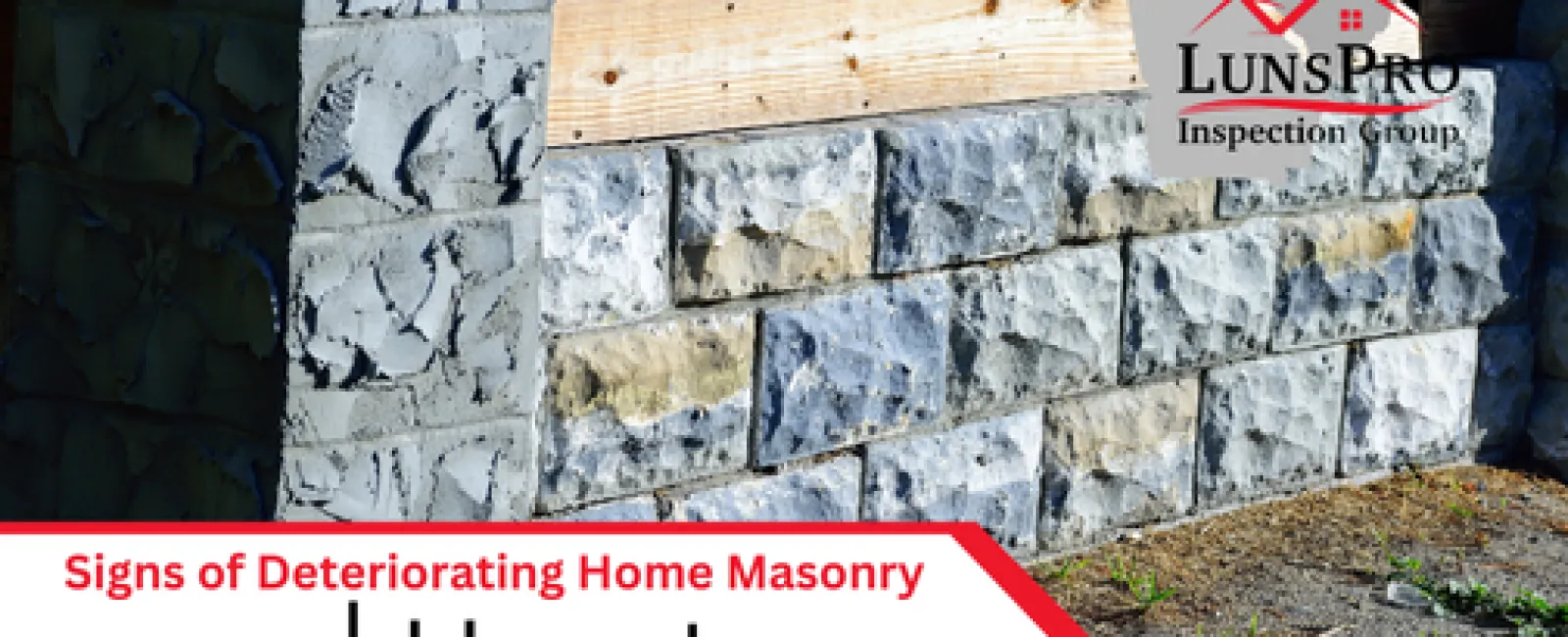Masonry is one of the most durable and aesthetically appealing features of a home, offering structural integrity, protection from the elements, and timeless beauty. However, even the most robust masonry isn't immune to wear and tear. Over time, environmental factors, improper maintenance, and natural aging can lead to significant issues that may compromise the safety and value of a property.
At LunsPro Inspection Group, a leader in Carolina residential and commercial inspections, we often encounter masonry problems during our comprehensive home inspections. These issues range from minor cracks to more serious concerns like structural instability. Addressing these problems early can save homeowners from costly repairs down the road. In this article, we'll explore the common signs of deteriorating masonry, how to inspect it effectively, and what solutions are available—including how infrared and drone technology can enhance the inspection process.
Why Masonry Maintenance Matters
Masonry includes materials like brick, stone, concrete, and mortar, often used in walls, chimneys, foundations, and facades. While durable, masonry is exposed to constant stress from:
- Weather: Rain, snow, and extreme temperatures can lead to water infiltration, freeze-thaw cycles, and erosion.
- Time: Mortar joints weaken, bricks shift, and stones crack as a home ages.
- Poor Construction: Improper techniques or materials during initial construction can result in premature deterioration.
Neglecting masonry problems can lead to more severe structural damage, energy inefficiency, and safety hazards.
Signs of Deteriorating Home Masonry
1. Cracks in Bricks or Mortar Joints
One of the most common indicators of masonry damage is cracking. Cracks may appear in the bricks, stones, or mortar joints, and their size and direction often provide clues to the underlying cause:
- Vertical Cracks: May indicate settlement issues.
- Horizontal Cracks: Often signify structural stress, such as bowing walls or foundation shifting.
- Stair-Step Cracks: A telltale sign of foundation movement or settling.
2. Spalling
Spalling occurs when bricks or stones flake, chip, or crumble, often caused by water penetration and freeze-thaw cycles. This issue weakens the masonry and can eventually lead to structural failure.
3. Efflorescence
The white, powdery residue often seen on brick surfaces is a result of water drawing salts from the masonry. While not immediately harmful, efflorescence indicates moisture infiltration—a precursor to more severe problems like mold or rot.
4. Bulging or Bowing Walls
If masonry walls appear to bulge outward or inward, it's a red flag for structural instability. This issue often stems from water damage, shifting foundations, or poor construction techniques.
5. Mortar Deterioration
Mortar binds the bricks or stones together, but it's also the most vulnerable part of masonry. Over time, it can crack, crumble, or erode due to weather exposure. This creates gaps that allow water and pests to enter.
6. Moisture Problems
Signs of moisture issues include discoloration, moss growth, or water stains on the interior or exterior walls. Prolonged moisture exposure can weaken masonry and lead to structural damage.
How to Inspect Home Masonry
While some issues may be visible to the naked eye, a professional home inspection provides a more thorough evaluation of masonry. At LunsPro Inspection Group, our inspectors use advanced tools and techniques to ensure no problem goes unnoticed.
1. Visual Examination
Inspectors start by visually assessing the condition of bricks, mortar joints, and adjacent structures. They'll look for common signs like cracks, spalling, and efflorescence, as well as any evidence of shifting or settling.
2. Infrared Technology for Hidden Damage
Water infiltration is one of the primary causes of masonry deterioration, but it isn't always visible on the surface. Infrared technology allows inspectors to detect temperature variations that indicate moisture trapped within walls, helping to identify problems before they become severe.
3. Drone Technology for Hard-to-Reach Areas
Chimneys, tall facades, and other elevated masonry features can be challenging to inspect manually. Using drone technology, inspectors can capture high-resolution images and videos of these areas, ensuring a comprehensive assessment without the need for scaffolding or ladders.
4. Foundation and Structural Checks
Masonry issues often stem from underlying problems with a home's foundation or structure. Inspectors will examine these areas to determine whether movement or settling is contributing to cracks or instability.
Solutions for Addressing Masonry Deterioration
Once masonry issues are identified, it's essential to address them promptly to prevent further damage. Here are some common repair and maintenance solutions:
1. Repointing Mortar Joints
Repointing involves removing damaged or eroded mortar and replacing it with fresh mortar. This process restores structural integrity and prevents water infiltration.
2. Sealing and Waterproofing
Applying a sealant or waterproofing agent to masonry surfaces protects them from moisture penetration. However, it's crucial to use breathable products that allow trapped moisture to escape.
3. Repairing or Replacing Damaged Bricks
Cracked or spalled bricks can be replaced individually to restore the appearance and stability of the structure.
4. Installing Drainage Systems
Improper grading and drainage around a home can exacerbate masonry problems. Installing or repairing drainage systems ensures water is directed away from the foundation.
5. Addressing Structural Issues
For bulging walls or significant cracks, more extensive repairs may be necessary, such as installing wall anchors, reinforcing beams, or underpinning the foundation.
Preventing Future Masonry Problems
Prevention is key to preserving masonry and avoiding costly repairs. Here are some maintenance tips:
- Inspect Regularly: Conduct routine checks for cracks, moisture, and other signs of damage.
- Clean Surfaces: Remove dirt, moss, and efflorescence to maintain the appearance and integrity of masonry.
- Control Water Exposure: Ensure gutters, downspouts, and grading direct water away from masonry walls.
- Maintain Mortar Joints: Repoint mortar as needed to prevent gaps that allow moisture to enter.
- Schedule Professional Inspections: Partner with experts like LunsPro Inspection Group for regular assessments using advanced tools like infrared and drone technology.
Why Choose LunsPro Inspection Group for Masonry Inspections?
At LunsPro Inspection Group, we specialize in thorough Carolina residential and commercial inspections that include detailed evaluations of masonry. Our certified inspectors are trained to identify even the most subtle signs of deterioration, ensuring that no problem goes undetected.
Masonry is a cornerstone of many homes, offering durability and timeless appeal. However, neglecting its maintenance can lead to serious problems that compromise a property's safety, value, and energy efficiency. Recognizing the signs of deteriorating masonry—such as cracks, spalling, and moisture issues—is the first step in addressing these challenges.
By investing in regular home inspections from LunsPro Inspection Group, homeowners gain access to advanced tools, ensuring every aspect of their property is thoroughly evaluated. Whether it's a minor repair or a major structural concern, our team provides the expertise and solutions needed to keep your home in top condition. Don't let masonry problems go unnoticed. Contact LunsPro Inspection Group today to schedule your Carolina residential and commercial inspection and take the first step toward preserving the integrity and beauty of your home.

